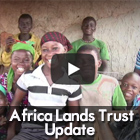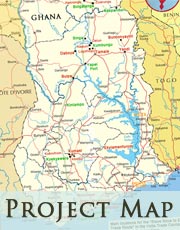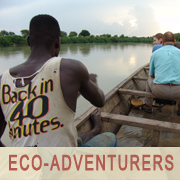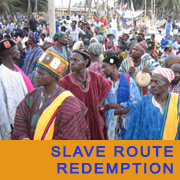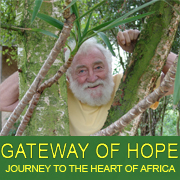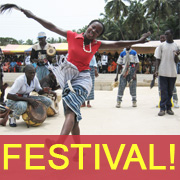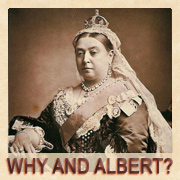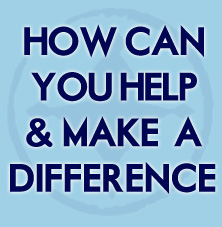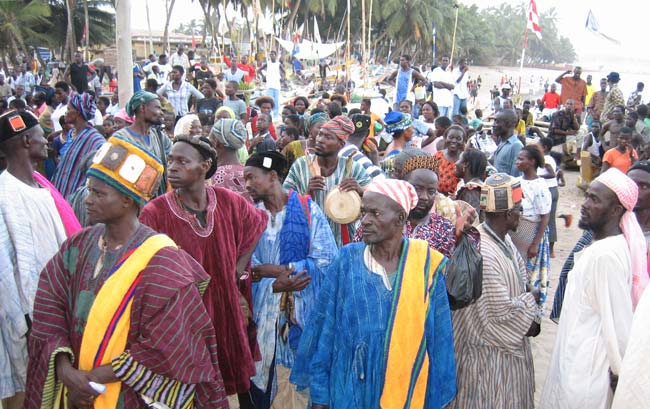
Above: 12 Tribes represented at the Wilberforce Bi-Centenary ’Freedom Festival’, Fort Anomabo, Ghana, in March 25th 2007, gathering to walk together into the Fort.
This brief account describes the Slave Route project in Ghana sponsored by and Albert over the past years since the vision was first shaped 25 years ago. "Trading for Life", with our Trading Roots ethical trade label, has been our consistent strategy to help the poorest groups help themselves by working for their own development. Trading in their arts and crafts, setting up and supporting an increasing number of workshops and sending regular containers to the UK, has been happening since the first container left Niger in 1993. Our "trading route" then followed from the Sahara desert in Niger with Touareg, Dzerma and Mossi crafts, through Burkina Faso and finally down through Ghana by 1995.
In Ghana, one buying trip explored the Northern remote "slave prison" village of Singa, across the White Volta, by canoe, and then a seven mile trek to the village along an old slave track. At the other end of this route South from there, another trip looked at the coastal fishing village (and historical slaving shipment centre) of Anomabo where I found the old British castle of Fort William, still intact.
In Singa the old Chief told us God had given him a dream of a white man coming to help his people! I was certainly the first white visitor! I also found out then that Singa was the last village on one main slave route from the Northern lands from Mali before the crossing of the White Volta. Its remoteness was confirmed by the local people who called it "overseas"! Its suffering, with no clean water, no medical accessibility, and waterborne diseases of many kinds from bringing the river water seven miles each day and leaving it unfiltered, was something I found hard to do nothing about. This suffering over the generations had given rise to the belief the place was cursed or too dangerous to visit! It was in fact an old slave prison village through which so many souls had been forced to travel for perhaps a hundred or more years on their embittered and exploited way.
I felt then that I had to try to fulfil the Chief’s prophecy and do something!
So here I was, some 21 years ago, presented with, by then, the obvious linking of our chosen places of work and trade along a slave-trade route of villages from the Sahara desert to the Atlantic Coast. I set in motion a conscious strategy to forge these new "freedom links" into a comprehensive method of sensitive development which suited the different tribes themselves and their very disparate environments. If, whilst this was tried, some of the links re-forged old alliances, broke down the frontiers artificially formed by Western colonial powers, or even forged new links with one-time enemies, slaves and slave-traders for example, all the better! Both David Livingstone and William Wilberforce recognised the power of adventurous honest trading to bring peoples together in a common bond of mutual assistance and understanding and saw it as a practical way to defeat slavery. Their inheritance stands against the poverty which still allows slavery to flourish.
In Singa, breaking the chains of slavery past, and the common curse of grinding poverty now, would require opening up the old river-boat trade. There are at least 100 small villages along the River down to the Volta Lake with disused warehousing at one end and skilled boatmen and fishermen at the other, who are rapidly becoming friends and thrilled with the idea of getting back to the old trading ways to eventually move forward again! It would not take much labour to turn the old slave-track from the River to the Village into a useful dirt road. We have already experimented with bigger boats and a tractor and trailer to transport goods and people. As the river has backed up and deepened as a result of the Akosombo dam, our new HDPE custom built boats will ensure safety for all, including those afraid of crocodiles!
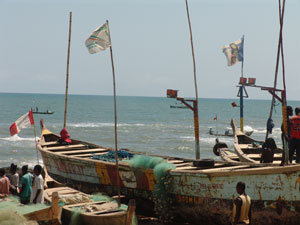 At Anomabo, Fort William, which was dedicated as a memorial to King George VI in 1954 by Queen Elizabeth II and due to be restored for African Youth, became a prison! Its historical shackles could not be thrown off! Our aim, together with supporters committed to reclaim anti-slavery history in both the UK and the USA (such as the Venture Smith project), is to break the chains of past evils and turn the Fort into a place of culture, modern communication and life for African young people to learn to respect how powerful and rich their own country and Heritage really are. They are not always aware of this, when the greed and superficiality of the West constantly threatens their growing minds with false attractions.
At Anomabo, Fort William, which was dedicated as a memorial to King George VI in 1954 by Queen Elizabeth II and due to be restored for African Youth, became a prison! Its historical shackles could not be thrown off! Our aim, together with supporters committed to reclaim anti-slavery history in both the UK and the USA (such as the Venture Smith project), is to break the chains of past evils and turn the Fort into a place of culture, modern communication and life for African young people to learn to respect how powerful and rich their own country and Heritage really are. They are not always aware of this, when the greed and superficiality of the West constantly threatens their growing minds with false attractions.
There are about 30 villages ear marked along this slave route from the Fort to the Desert where we are building a programme of village "repair and regeneration". This is centred firstly on the trading of goods and commodities through the very old-fashioned idea of "Trading Posts" secondly on tree nurseries and plantations and agricultural/horticultural schemes centred on tried and trusted methods, all of them fully organic; thirdly on culture and heritage centres for music, poetry and story-telling, children’s nurseries and playgrounds as "learning through play" centres. Put all these ingredients together and one has a model which could be as successful as the British rural estates, where work, culture and community is shared so easily and creates cohesion, cooperation and shared wealth
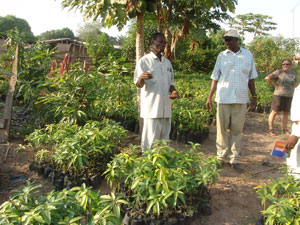 For 25 years I have taken out students and designer/buyers and interested friends to "see for themselves" and offer further objective insights into our strategies. As we finish indigenous guest houses in each place along the route this could develop into a full programme of education for Westerners via sensitive eco-tourism beginning this year.
For 25 years I have taken out students and designer/buyers and interested friends to "see for themselves" and offer further objective insights into our strategies. As we finish indigenous guest houses in each place along the route this could develop into a full programme of education for Westerners via sensitive eco-tourism beginning this year.
Finally my vision would link this redeemed slave-trade route (and others which could follow in West African countries) with the "children" of slaves and traders of the Diaspora in UK/Europe, the West Indies and the Americas. This would be to forge long-term relationships through new trading partnerships, visits, and educational exchanges.In my "Wilberforce" City of Kingston upon Hull this could mean having a custom built cargo/passenger boat voyaging between Hull and Takoradi in Ghana on a regular basis for those small traders who can’t afford whole containers…or folk who object to flying! Until Fruit Market traders taste our Burkina organic mangoes they ain’t tasted Mango!
In West Indies and America it would mean the Diaspora coming home to trace their roots of wonderful culture, music and skills and invest in their Heritage in all these representative environments. However this is a pioneering means and way forward thus:
Africa offers a Treasure Chest of growing opportunities for the investment of yourselves, your time, talents, and even your objective ideas alone, released from the confines of Western political correctness, into this already colourful mix of creative ingredients.
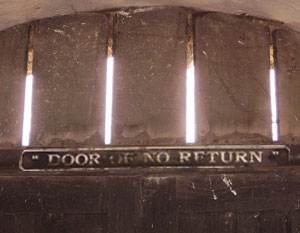 The Gateway leading onto the beach at Fort William where the shackled were taken over to the waiting ships was a gateway of despair and no return indeed. Help us all to redeem it into a gateway of hope and creativity for the ancestors and the children of this pernicious trade. Help us to make Ghana truly the “Gateway to Africa”! Whatever evil and curse pushed out the African Diaspora into the Western developing democracies it was "redeemed" by their sacrifice into so many blessings for the world: in faith and hope, in music and art and sheer perseverance in the face of adversity where only love won through.
The Gateway leading onto the beach at Fort William where the shackled were taken over to the waiting ships was a gateway of despair and no return indeed. Help us all to redeem it into a gateway of hope and creativity for the ancestors and the children of this pernicious trade. Help us to make Ghana truly the “Gateway to Africa”! Whatever evil and curse pushed out the African Diaspora into the Western developing democracies it was "redeemed" by their sacrifice into so many blessings for the world: in faith and hope, in music and art and sheer perseverance in the face of adversity where only love won through.
The West owes this debt which no amount of reparation can cover. It would be an impossible task to analyse and administrate. However, by helping to redeem their origins and caring for their precious environments would continue to bless the whole world with a feast of opportunities fulfilled and the land helped, but not spoiled, by benign technologies.
Thanks to donations from Rotary International, on January 29th 2017 we "launched" the first medically-equipped Hospital boat to serve these neglected tribes on the upper reaches of the White Volta. We link it to the Hull City of Culture 2017 with its appropriate name, Wilberforce 1.
Once finance is established, it will immediately be followed by 2 more river boats equipped to survey the remote villages and transport goods and personnel, Wilberforce 2 and Venture Smith 1. Any further information or opportunities for presentations and investments please contact me personally here.

